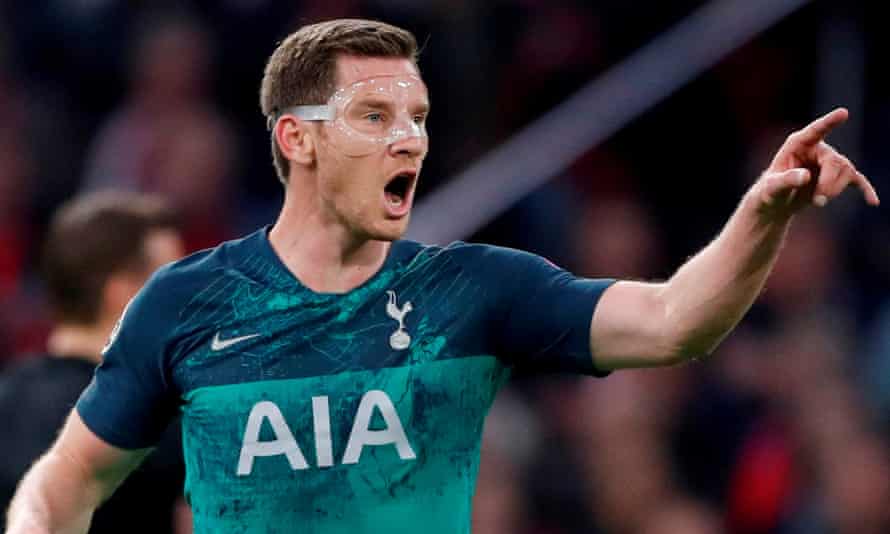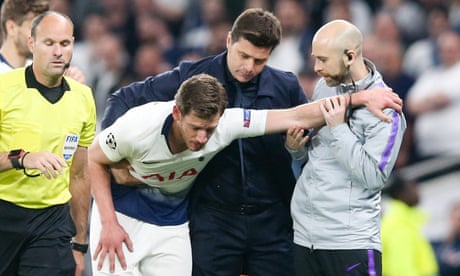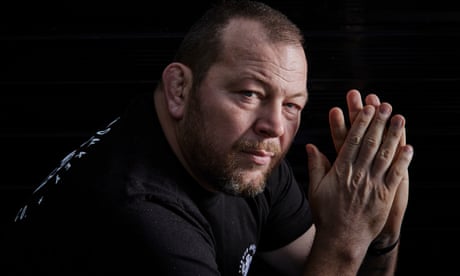'People will forgive you for being wrong, but they will never forgive you for being right - especially if events prove you right while proving them wrong.' Thomas Sowell
Search This Blog
Wednesday, 23 December 2020
Tuesday, 22 December 2020
The Jan Vertonghen case shows concussion is all part of the sporting capitalism system

It was around the end of last year that people began to notice Jan Vertonghen was looking decidedly off the pace at Tottenham. He was slow off the mark, slow to the ball, slow to react. Occasionally entire passages of play seemed to pass him by. And so, naturally, as an underperforming player in a popular ball game, it felt only right that he should be subjected to the same pitch of ridicule and abuse as anyone else in his position.
I went back through social media during some of his poorer games last season and pulled out a few of the more representative comments from Spurs fans and others. “Legs gone.” “Sad, but hasn’t got a clue what day it is.” “Get this clown out of my club.” “Finished.” “Past it.” “Utter disgrace.” “Sell.” “Dead wood.” “Stealing a living.” “Happy if I never see him in the shirt again.”

Jan Vertonghen reveals head blow led to nine months of dizziness and headaches
Well, now we know what was really going on. Last week Vertonghen revealed that for most of last season he was enduring the after-effects of a concussion sustained against Ajax the previous April. “I suffered a lot from dizziness and headaches,” said Vertonghen, now at Benfica. “It affected me for eight or nine months. I still had a year left on my contract, and thought I had to play because I had to showcase myself to other clubs.”
On Monday a working group led by the Premier League and featuring the Football Association, the EFL, Professional Footballers’ Association and Women’s Super League sat down to discuss whether there should be restrictions on heading the ball in adult football. It follows a 2019 study by the University of Glasgow that found professional footballers were three times more likely to die of neurodegenerative diseases than the rest of the population.
Meanwhile, the former England hooker Steve Thompson is one of a number of former players launching legal action against World Rugby, the Rugby Football Union and Welsh Rugby Union for an alleged failure to protect them from repeated head traumas.
Thompson is 42 and has been diagnosed with dementia. He no longer remembers winning the World Cup in 2003. “Was it a massive love of my life?” he said of rugby union in an interview with this newspaper two weeks ago. “No, not really. But it was a job.”
A question to consider as you scroll through all this: what does it make you feel? Sadness? Or sadness with a “but”? But: Vertonghen and Thompson knew what they were doing. But: they were handsomely paid for their trouble. But: you can’t ban heading in football, that’s just ridiculous.
But: any of us could get a traumatic brain injury simply by walking down the street and into the path of a falling piano. Life is risky. Sport is dangerous.
Perhaps this is a moment to consider what we owe the people risking their safety for our entertainment
There is a broad school of thought here that at its core, the debate over head injuries in elite sport – one that can easily be extended to other areas of player welfare – is simply a matter of personal choice. If athletes are prepared to embark on a career in professional sport, then as long as they do so fully apprised of the risks and in possession of the latest medical science, who are we to impede them?
Occasionally you will even see this idea expressed in terms of liberation, self-actualisation, even gratification: the notion that danger is not only part of the basic thrill of sport, but also the very point. That the essence of sport is bound up in sacrifice. That on some level we are all animalistically addicted to testing ourselves, pushing ourselves, breaking ourselves. Or at the very least, watching with a beer while others do.

Steve Thompson: 'I can't remember winning the World Cup'
If we can no longer pay teenagers ridiculous money to give themselves brain damage for our gratification, then frankly are we even still free as a species? And ultimately, this is a question that cuts to the very core of what sport means, and who it serves. After all, choices are not made in a vacuum: they are influenced, impelled, incentivised.
Vertonghen played on because he felt his livelihood was on the line. Thompson played on because it was his job to do so. No scientific paper or well‑intentioned press release will ever override the profit motive. And so to focus on personal autonomy is to ignore the extent to which athletes, like all labour, are co-opted into an economy that they did not choose and over which they have little to no influence.
This is, of course, how sporting capitalism works: I get entertained, you get paid, and everything else is window dressing. Sporting capitalism simply buys off your fatigue, your mental health issues, your insecurities, your quality of life, your memory loss, your pain. If you tear a ligament, then it’s financially counterproductive for your club to make you play.
But a concussion? Well, we didn’t see anything, and obviously you can’t, so … how about we keep this one to ourselves? Partly this is a critique of a system that essentially regards the athlete as industrial plant: a part, a tool, a resource from which to extract performance value. But partly, too, this is a process in which we all participate. And for those of us who take pleasure from sport, perhaps this is a moment to consider what we owe the people risking their safety for our entertainment. To remember that welfare does not begin and end with a wage.
To bear in mind, above all, that within every superhuman athlete there is a human who bends and breaks like everyone else.
Time spent in the pub is a wise investment
Sarah O'Connor in The FT
When I joined the Financial Times as a trainee in 2007, I spent a lot of time learning about credit default swaps and a similar amount of time in the pub. The CDS knowledge proved useful in the ensuing financial crisis, but 13 years later, I am glad of the hours spent in the pub too.
It was how I got to know my colleagues, who taught me the FT’s folklore, its funny anecdotes and its subtle power dynamics. I just thought I was having fun, but an economist would have said I was building “social capital”, defined by the UK’s statistical office as “the extent and nature of our connections with others and the collective attitudes and behaviours between people that support a well-functioning, close-knit society”.
Social capital is a fuzzy concept and hard to measure. But Covid-19 has made us think about who has it, who doesn’t, how we build it and how we lose it.
I was near the end of my maternity leave when the pandemic started, so it has now been almost 18 months since I last worked in the office. I’m grateful every day for my store of social capital, which has helped me to stay connected, though I do get a twinge of anxiety with every new byline I don’t recognise.
It has been much tougher for people starting out this year. If it is hard to maintain relationships via video calls, it is harder still to build them from scratch. I spoke recently to some senior accountants about their new crop of trainees. They were learning their trade, but there was no opportunity for general chit-chat before and after virtual meetings, and the trainees seemed to find it harder to ask “daft questions” in video calls than when “sitting round a table with a packet of biscuits”.
Next year, employers will have to think creatively about how to help new employees “catch up” on forming social capital, especially in a world of “hybrid” work where people stay at home for several days a week.
Inadequate social capital is a problem for organisations as well as individuals. Research suggests that social capital boosts efficiency by reducing transaction and monitoring costs. In other words, “society wastes resources when people distrust and are dishonest with each other”, according to Dimitri Zenghelis, leader of the Wealth Economy project at Cambridge university, which explores social and natural capital.
I am often struck by the inefficiencies of distrustful workplaces. Companies using screenshot and mouse-tracking software can end up in a cat-and-mouse game with resentful workers using tech workarounds of their own. Employers who doubt the honesty and motivation of their staff compel line managers to hold “return to work” meetings with employees after every sickness absence, even of only a day. Factories and warehouses often have long queues at shift changes as staff go through scanners to prove they are not stealing. Covid-19 might push some employers further in this direction, particularly if they decide to use more offshore workers with whom they have no prior relationship.
On the other hand, this year’s forced experiment with homeworking has made some employers realise their staff can be trusted to work productively without oversight. The key will be to hold on to that trust, and the efficiencies it brings, rather than slip back into old habits of micromanagement.
Social capital matters for economies, too. For his book Extreme Economies, economist Richard Davies travelled to nine unusual places, from a refugee camp in Jordan to an Indonesian town destroyed by the 2004 tsunami. He was struck by how societies with higher social capital were more resilient when disaster struck. In Glasgow, by contrast, he argued that the replacement of tenement homes with tower blocks had dismantled the social capital of the people who lived there, making it harder for them to cope with economic decline.
For both individuals and economies, social capital is an important buffer against unexpected hardships. Yet in the UK, where the Office for National Statistics has been trying to track various indicators of social capital over time, the trend has not been good. We exchanged favours or stopped to talk with our neighbours less often in 2017/18 than we did in 2011/12. Our sense of belonging to our neighbourhoods also fell. Parents became less likely to regularly give help to, and receive help from, their adult children.
The pandemic has strained our ability to maintain the bonds between us, but it has also reminded us just how important they are. Any plan to “build back better” when the crisis ends should include plenty of time in the pub.